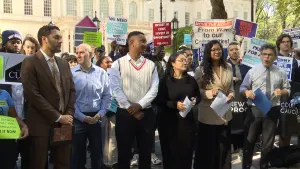Voters to decide on Environmental Bond Act that would allocate $4.2B to fund statewide environmental projects
While the candidates for governor and congress are dominating next week's midterm election there are several propositions where voters will have a major say in policies.
Share:
More Stories
2:34

Guide: Safety tips to help prevent home burglaries
433ds ago2:19

Guide: Safety measures to help prevent fires and how to escape one
581ds ago2:40

Mayor's budget cuts: A controversial solution amidst immigration crisis
600ds ago2:07

Tips on how to avoid confrontation with sharks while swimming in the ocean
665ds ago2:33

5 tips to prevent mosquito bites and getting sick from viruses
676ds ago2:39

NEWS 12 EXCLUSIVE: ‘He drove into the water.’ Car drives off dock in Patchogue; News 12 crew helps in the rescue
697ds ago2:34

Guide: Safety tips to help prevent home burglaries
433ds ago2:19

Guide: Safety measures to help prevent fires and how to escape one
581ds ago2:40

Mayor's budget cuts: A controversial solution amidst immigration crisis
600ds ago2:07

Tips on how to avoid confrontation with sharks while swimming in the ocean
665ds ago2:33

5 tips to prevent mosquito bites and getting sick from viruses
676ds ago2:39

NEWS 12 EXCLUSIVE: ‘He drove into the water.’ Car drives off dock in Patchogue; News 12 crew helps in the rescue
697ds agoWhile the candidates for governor and Congress are dominating next week's midterm election there are several propositions where voters will have a major say in policies.
Voters will choose whether to approve or strike down the Environmental Bond Act that will allow the state comptroller to issue $4.2 billion worth of bonds to fund statewide environmental projects.
A total of $1.5 billion will go towards climate change, $1 billion for flood risk reduction, plus hundreds of millions of dollars for land conservation and water quality improvement.
What does this mean for the Hudson Valley?
Protections for the Hudson River, transitioning to more electric vehicles and improvements to historically underserved communities.
One Yonkers resident says he plans to vote for the proposition because he is still cleaning up more than a year after Hurricane Ida.
"Any positive thing in the neighborhood is going to work so if it's going to help, it's going to help," says Lloyd Cheatwood, of Yonkers.
Former Gov. Andrew Cuomo originally introduced a version of this act in 2020 for $3 billion. The state Legislature approved the measure but it was pulled from the ballot because of the economic uncertainty at the beginning of the pandemic.
Cuomo then reintroduced the measure the following year, but Gov. Kathy Hochul modified it after Cuomo resigned. She added $1 billion in funding which also passed the Legislature in the spring.
Here's the breakdown:
$1.5 billion in climate change mitigation (which includes funds for zero-emission school buses)
$1.1 billion in restoration and flood risk reduction.
$650 million in open space land conservation and recreation.
$650 million in water quality improvement and resilient infrastructure.
$300 million in unallocated funds.
The measure also dictates that 35% of the total funds must be spent in disadvantaged communities.
More from News 12
1:48

Some rain possible Tuesday in The Bronx
1:21

Soundview Slices NYC opens in the Bronx
1:14

New Jersey native reunited with family after being held hostage in Gaza for 19 months
2:17

NYPD: Police release identity of 16-year-old fatally shot in Morrisania schoolyard
2:30

EXCLUSIVE: Soloviev CEO pitches plan to turn everyday New Yorkers into partial owners of proposed casino
1:51
